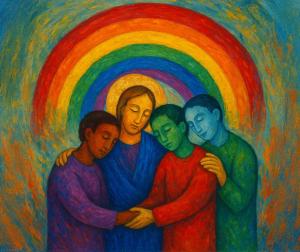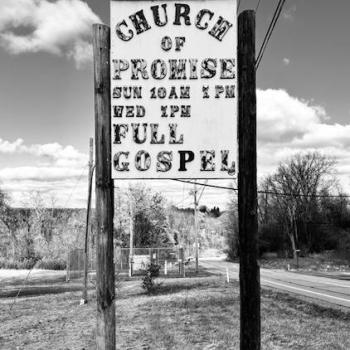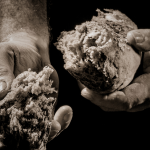
Faith and LGBTQ
Exploring the intersection of faith and LGBTQ identity reveals a tapestry of complex experiences, where spirituality can serve both as a source of solace and as a challenge. For many, faith provides a grounding sense of purpose and belonging, yet the interpretation of religious doctrines can sometimes conflict with LGBTQ realities, impacting mental well-being. Striving for inclusivity, communities and leaders are increasingly fostering spaces for mutual understanding, honoring both spiritual journeys and diverse identities.
As a disclaimer, I am not a member of the LGBTQ+ community, but am an ally who believes the Gospel and the kenotic love of Christ exist for all who believe. We are challenged by Jesus and later by Paul in Galatians 3 to look beyond the walls we set up in our faith.
Why are Christians So Threatened?
Sexuality has narrowly been defined in the traditional Christian context as a binary, specifically elevating men (natal male gender, often white) over other humans and creatures. This has created a complex web of bad theology and terrible interpretation of scripture, and as a result, countless sufferings for those who do not conform to this box. While sexual orientation and gender are a problem now, they are part of a larger problem with how the church and its clergy see their role in the life of its community.
Power and control have dominated the Christian narrative, especially in the early Christian church up to the Reformation and into today. Largely dominating the European landscape, Catholicism was an empire that controlled how the masses thought and behaved for 1500 years. After the Reformation, all this changed as Protestant reform was ushered in with new ideas on what it meant to be Christian and human. A rigidity of faith and a failure to grow deeply beyond the orthodoxies of our churches have kept us stuck and have kept us from seeing others in our communities.
Another problem is the church’s missiology, which often puts the church at the head of a community as a beacon that knows what is best with the right messaging and “doing” mission for rather than with the communities around them.
We need to lean more into the religion of Jesus and the mission of the Acts 2 church, which puts the community at the heart of the church. We must empty our silos and share our grains.
Awareness

Whether we accept it or not, we all have or had an experience with the divine. God shows up for all of God’s creation, regardless of how they present. Furthermore, humans we are told are made in the likeness of God. Each one of us is imprinted with God’s fingertips, we are as Genesis tells us, wonderfully made. While it is acceptable today that people of color and women experience God in a unique way, we are not quiet there when we think about our brothers and sisters in the LGBTQ+ community. The stigma still exists that somehow these believers are sinful and are not right with God.
The reality is that Jesus sided with those who were “othered’ in his first-century society. Jesus himself was a refugee living in an occupied country. None of our traditional theologies can help us understand or interpret the experience the “other” has had with God. Instead, we turn to a form of theology known as liberation theology to guide our way to hear these voices.
“Liberation theology is born out of practice and requires active participation through living in solidarity with the poor. Through practicing liberation theology via personal contact with poor communities, one is able to “acquire new theological sensitivity” (Boff 23). Those who seek to practice liberation theology must live in solidarity with the disenfranchised. Through this solidarity, liberation theology is informed “about the actual conditions in which the oppressed live, the various forms of oppression they may suffer” (Boff 24). Solidarity is an important aspect of liberation theology, as is the biblical understanding of the roots of liberation. While the components of liberation theology can be found in many books of the Bible, especially in Exodus, the Prophets, the Gospels, the Acts of the Apostles and Revelation (Boff 35), this paper will focus primarily on the narrative of the Exodus and the Gospels.”
Queer theology affirms that “Sexuality is an integral part of being human for reason of the intimate bonding that occurs in all loving sexual acts, whether procreative or not. Sexuality is “part of God’s creation and a means for beginning to understand love and the love of God” (Goss, Queering Christ 113).” When we think of sexuality this way, we can begin to see how this is created for everyone, not just the binaries we have placed around it with our bad theologies and literal interpretations of the bible.
The reality is that we still condemn. Solidarity is our call to faith and action.
A 21st Century Faith
The world is changing and has been forever. With our brothers and sisters of the LGBTQ+ faith, we have not been obedient. We have been blind to their needs and their relationship with God and the kindom. The journey ahead requires a deliberate embrace of compassion, listening, and reforming theologies that have been wielded as tools of exclusion. By choosing to interpret scripture through a lens of love and liberation, believers can uncover the deeper truths of their faith—truths that affirm the inherent value and spirituality of every individual. It is through this transformative effort that the church can truly embody the teachings of Jesus, becoming a sanctuary where all are welcomed, celebrated, and affirmed in their unique relationships with God.
As a church, we need to do better. Our churches were meant for healing. John Wesley, my church’s founder, believed in first, doing no harm.
An example this week comes from Bishop Hee – Soo Jung, Bishop of the West Ohio Conference, written for their Annual Conference by the Reverend Doctor Deborah Stoker Stevens. This document addresses the steps needed for reconciliation and repentance towards individuals who have been hurt or alienated. Permission has been granted by the author to share the litany in its entirety.
A Litany of Confession
(written for the West Ohio Conference by the Rev. Dr. Deborah Stoker Stevens)
John Wesley’s first general rule is “Do no harm.” Today, we are called to confess that in the struggles of our church over the past decades, the actions of this body have harmed siblings in Christ.
When one part of the body suffers, all suffer. Therefore, let us confess our sin in the presence of the One who hears us and heals us.
Let us pray:
Merciful God, we confess that we have not loved you with our whole heart. We have failed to be an obedient church…
We have hidden behind the habits of old processes and missed the fresh breath of a new Spirit.
We have mis-used rules that were made to serve the church, serving instead only the rules themselves.
We have confused secrecy with confidentiality, creating barriers for LGBTQ+ candidates for ministry.
We have clung to a polity of power and failed to see the power of people rising up in a faithful community advocating for justice.
Merciful God, forgive us that we have not done your will.
In clinging to our rules, we have broken your law of love.
In failing to treat those who see as “other” as beloved siblings, we
Have rebelled against your love.
Forgive us that we have loved power more than we have loved people.
Forgive us that we have loved polity more than we have seen people.
Forgive us that we have loved processes more than we have embraced people.
Forgive us that we have loved rules more than we have listened to people.
Forgive us that we have preferred easy answers to honest wrestling with the words of Scripture.
Forgive us for mistaking the silencing of dissenting voices as peace.
Merciful God, your church has always struggled with obedience to love.
We failed indigenous people.
We failed people of color.
We failed women.
We failed Lesbian, Gay, Bisexual and Transgender people.
We failed to hear the cry of those on the margins.
We are still failing.
We lament those lost because of our rejection of their very lives.
We give thanks for those who faithfully persisted, offering their prayers, presence, gifts, service and witness to the church in joyful obedience, refusing to let the injustice of the church deny their humanity, their gifts, or their call.
Silence
Together, we repent:
We repent of our failure to give equal opportunity of appointment and compensation to people of color and women, and especially to women of color.
We repent of our denial of credentialing to countless faithful, gifted, qualified disciples who were called to ministry in the United Methodist Church.
We repent of our denial of the United Methodist Service of Christian Marriage to faithful same sex couples.
We repent of using Disciplinary charges as a tool of oppression against those who sought to live authentic lives as LGBTQ+ clergy.
Silence
Today, let the West Ohio Annual Conference reclaim the way of Jesus – loving all, rejecting none. Let us claim the fresh spirit that moved Paul to declare that there are no divisions, that all are one in Christ Jesus.
Today, let us see one another’s hearts, hear one another’s stories, embrace one another’s differences, and rise up together as beloved community.
Today, let us resolve to make amends in our policies, our rules, our behaviors, and our lives that reflect this commitment.
Merciful God, from the ashes of our repentance, clothe us with garments of praise, bless us with your righteousness, raise us up, and free us for joyful obedience, through Jesus Christ, our ever-loving Savior.
Amen.













